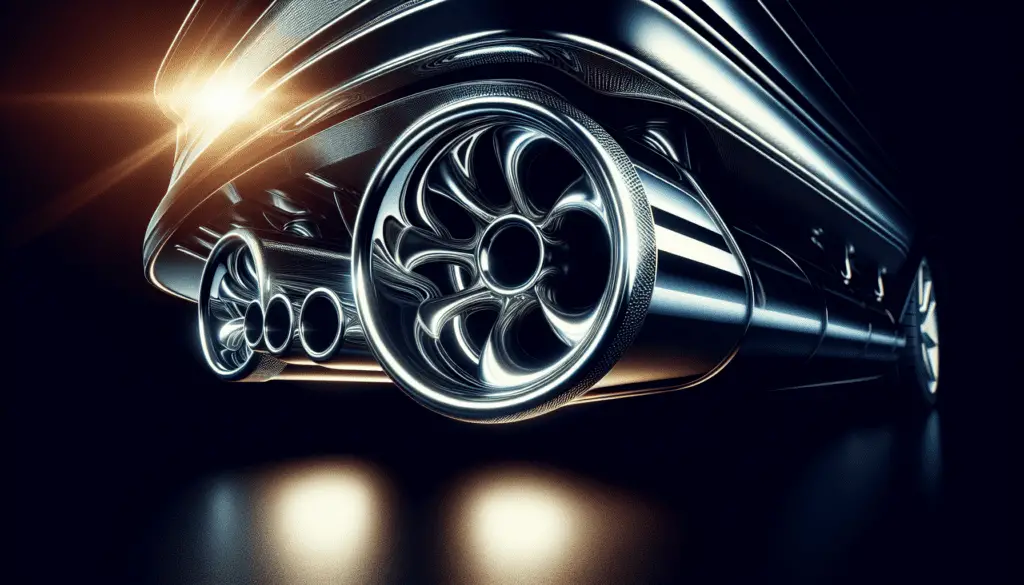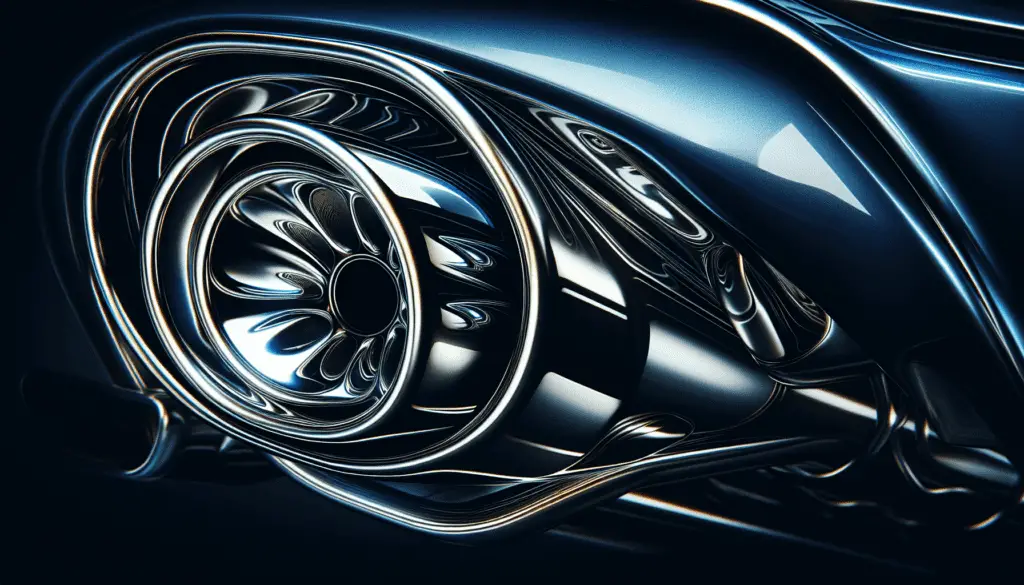You’re in for a treat! Get ready to unleash the full potential of your Ford vehicle as we present to you “The Ultimate Ford Performance Exhaust Guide.” This comprehensive guide is packed with all the information you need to know about upgrading your exhaust system to boost your car’s performance and take it to the next level. From understanding the different types of exhaust systems available to tips on choosing the perfect one for your specific Ford model, we’ve got you covered. So, buckle up and get ready to turn heads with an exhilarating roar from your Ford’s new performance exhaust!
1. Understanding Ford Performance Exhaust Systems
What is a performance exhaust system?
A performance exhaust system is an aftermarket upgrade that enhances the performance, sound, and appearance of a Ford vehicle’s exhaust system. It replaces the stock exhaust system with high-quality components designed to optimize the flow of exhaust gases and increase horsepower and torque. A performance exhaust system typically includes components such as exhaust headers, catalytic converters, performance mufflers, and exhaust tips.
Why upgrade to a Ford performance exhaust system?
Upgrading to a Ford performance exhaust system offers several advantages. Firstly, it improves the overall performance of your vehicle by increasing horsepower and torque. The enhanced exhaust flow allows the engine to breathe more efficiently, resulting in improved acceleration and throttle response.
Secondly, a performance exhaust system can enhance the sound of your Ford vehicle. Ford performance exhausts are designed to produce a deep, aggressive, and sporty sound, adding a touch of excitement to your driving experience. The sound is carefully engineered to complement the vehicle’s performance and provide a satisfying rumble.
Lastly, a performance exhaust system can enhance the appearance of your Ford vehicle. With various options for exhaust tips, ranging from polished stainless steel to carbon fiber, you can choose a style that matches your personal preference and complements the overall aesthetics of your vehicle.
Different types of performance exhaust systems
Ford offers a range of performance exhaust systems to cater to different models and customer preferences. Some popular options include the Ford Mustang GT Performance Exhaust, Ford F-150 Raptor Performance Exhaust, Ford Focus ST Performance Exhaust, Ford Fiesta ST Performance Exhaust, and Ford Shelby GT350 Performance Exhaust. Each system is specifically designed to deliver optimal performance and sound characteristics for the respective vehicle.
Benefits of a performance exhaust system
There are several benefits to installing a performance exhaust system on your Ford vehicle.
Firstly, it increases horsepower and torque, resulting in improved acceleration and overall performance.
Secondly, it enhances the sound of your vehicle, giving it a more aggressive and sporty tone.
Additionally, a performance exhaust system can improve fuel efficiency by optimizing the exhaust flow, allowing the engine to work more efficiently.
Finally, upgrading to a performance exhaust system can also enhance the resale value of your Ford vehicle, as it is seen as a desirable aftermarket modification among enthusiasts.
Considerations before choosing a performance exhaust system
Before selecting a performance exhaust system for your Ford vehicle, there are a few factors to consider.
Firstly, you should consider your intended use for the vehicle. If you primarily use your Ford vehicle for daily commuting, a performance exhaust system with a moderate sound level may be more suitable. However, if you enjoy spirited driving or track events, you may opt for a system that produces a more aggressive and louder sound.
Secondly, you should consider your budget. Performance exhaust systems vary in price, depending on the brand, materials, and included components. Set a budget and research the options that fall within your price range.
Lastly, it is important to ensure that the performance exhaust system you choose is compatible with your specific Ford vehicle model. Different models may require different fitments and configurations, so it is advisable to consult with a knowledgeable expert or refer to the manufacturer’s specifications.
2. Ford Performance Exhaust System Options
Ford Mustang GT Performance Exhaust
The Ford Mustang GT Performance Exhaust is designed specifically for the iconic muscle car. It offers a combination of improved performance, sound, and appearance. The Mustang GT Performance Exhaust features high-flow exhaust headers, performance mufflers, and exhaust tips. The system is engineered to maximize exhaust flow, resulting in increased horsepower and torque. The exhaust note is deep, aggressive, and unmistakably Mustang. With various options for exhaust tips, including chrome, black, or carbon fiber, you can customize the appearance of your Mustang GT to your preference.
Ford F-150 Raptor Performance Exhaust
Designed for the rugged and capable Ford F-150 Raptor, the Performance Exhaust system is built to withstand the demands of off-road driving. It features high-quality stainless steel construction for durability and enhanced performance. The F-150 Raptor Performance Exhaust delivers improved horsepower and torque, as well as a deeper and more aggressive exhaust note. It is designed to optimize exhaust flow and enhance the overall driving experience.
Ford Focus ST Performance Exhaust
The Ford Focus ST Performance Exhaust is engineered to deliver enhanced performance and a sporty sound for the performance-oriented hatchback. The system includes high-flow exhaust headers, performance mufflers, and dual exhaust tips. It is designed to maximize exhaust flow and increase horsepower and torque. The exhaust note of the Focus ST Performance Exhaust is refined and sporty, giving the vehicle a more aggressive presence on the road.
Ford Fiesta ST Performance Exhaust
The Ford Fiesta ST Performance Exhaust is designed for the compact and spirited Fiesta ST. It offers improved performance and a more exhilarating driving experience. The system includes high-performance exhaust headers, a performance muffler, and exhaust tips. The Fiesta ST Performance Exhaust is designed to optimize exhaust flow and increase horsepower and torque. It is known for its distinctive sound, which adds a sporty and energetic tone to the Fiesta ST.
Ford Shelby GT350 Performance Exhaust
The Ford Shelby GT350 Performance Exhaust is specifically designed for the legendary GT350 muscle car. It offers exceptional performance enhancements and an aggressive exhaust note that befits the car’s track-ready nature. The system includes high-flow exhaust headers, performance mufflers, and quad exhaust tips. It is designed to maximize exhaust flow and increase horsepower and torque, enabling the GT350 to deliver its full potential on the road or track.

3. Performance Exhaust Components
Exhaust Headers
Exhaust headers, also known as exhaust manifolds, are an essential component of a performance exhaust system. They collect the exhaust gases from each cylinder and channel them into a single exhaust pipe. Performance exhaust headers are designed to optimize exhaust flow by reducing backpressure. They are typically made from stainless steel or other high-quality materials to withstand high temperatures and provide long-term durability.
Catalytic Converters
Catalytic converters are an integral part of the exhaust system, responsible for reducing harmful emissions. Upgrading to a performance exhaust system often involves replacing the stock catalytic converters with high-performance alternatives. Performance catalytic converters are designed to offer less resistance to exhaust flow and maximize efficiency.
Performance Mufflers
Performance mufflers are designed to enhance the sound of the exhaust system while reducing excessive noise. They use specialized internal chambers and baffles to modify the exhaust flow and produce the desired sound characteristics. Performance mufflers are often made from high-quality materials to withstand the increased heat and offer long-lasting performance.
Exhaust Tips
Exhaust tips are the visible part of the exhaust system that exit the rear of the vehicle. They come in various shapes, sizes, and finishes, allowing you to personalize the appearance of your Ford vehicle. Performance exhaust systems often offer options for exhaust tips made from stainless steel, carbon fiber, or other high-quality materials. The choice of exhaust tips can greatly impact the overall look and style of your vehicle.
4. Performance Exhaust Materials
Stainless Steel
Stainless steel is a popular material choice for performance exhaust systems due to its durability and resistance to corrosion. It offers excellent heat resistance, making it suitable for high-performance applications. Stainless steel exhaust systems provide long-lasting performance and maintain their appearance over time.
Titanium
Titanium is a lightweight and high-strength material commonly used in performance exhaust systems. It offers exceptional heat resistance and is often used in high-performance and racing applications. Titanium exhaust systems are known for their weight savings, which can contribute to improved overall performance.
Carbon Fiber
Carbon fiber is a lightweight and high-strength material that is commonly used in high-end performance exhaust systems. It offers excellent heat resistance and has a unique visual appeal. Carbon fiber exhaust systems are often used in sports and exotic cars, providing a premium appearance along with enhanced performance.
Aluminized Steel
Aluminized steel is a cost-effective alternative to stainless steel for performance exhaust systems. It offers good corrosion resistance and durability, making it suitable for a wide range of applications. Aluminized steel exhaust systems provide a balance between performance and affordability.

5. Sound and Tone Options
Different sound profiles offered
Ford performance exhaust systems are designed to offer various sound profiles to cater to different preferences. Some systems produce a deep and aggressive rumble, while others have a smoother and refined tone. The specific sound profile can vary depending on the vehicle model, engine configuration, and exhaust components.
Tips for choosing the right sound for your Ford
When choosing a performance exhaust system for your Ford, it is important to consider your personal preferences and the intended use of the vehicle. If you prefer a more subdued and refined sound, you may opt for a system with quieter mufflers. On the other hand, if you enjoy a more aggressive and attention-grabbing exhaust note, you may choose a system with a freer-flowing design and less sound-damping.
Resonator and muffler options for specific tones
The sound characteristics of a performance exhaust system can be further fine-tuned by selecting different resonators and mufflers. Resonators are designed to dampen specific frequencies and can be used to achieve a desired sound profile. Mufflers, on the other hand, control overall noise levels and can be selected based on the desired volume and tone.
Effects of sound on performance
While the primary purpose of a performance exhaust system is to improve performance, the sound it produces can also have a psychological impact on the driver. A deep and aggressive exhaust note can evoke a sense of power and excitement, enhancing the overall driving experience. It can also provide audible feedback on engine performance and throttle inputs.
6. Installation and Cost Considerations
Do-it-yourself installation vs. professional installation
Installing a performance exhaust system can be a DIY project for those with mechanical experience and the necessary tools. However, if you are not familiar with automotive work or do not have the required tools, it is recommended to have the system installed by a professional. Professional installation ensures proper fitment and eliminates the risk of damaging your vehicle during the installation process.
Tools and equipment required for installation
If you choose to install the performance exhaust system yourself, you will need a basic set of hand tools, including wrenches, sockets, and a torque wrench. Specific tools required may vary depending on the vehicle model and the components included in the exhaust system. It is advisable to refer to the manufacturer’s instructions or consult with an automotive expert for a comprehensive list of required tools.
Cost of a performance exhaust system
The cost of a performance exhaust system can vary depending on the brand, materials, and included components. Entry-level systems may start around $500, while high-end systems can exceed $2,000. It is important to consider factors such as overall quality, durability, and performance gains when comparing the cost of different systems.
Additional costs for installation
In addition to the cost of the performance exhaust system, there may be additional costs associated with installation. This can include labor fees if you choose to have the system professionally installed. It is also recommended to budget for any necessary modifications, such as exhaust hangers or gaskets, during the installation process.

7. Exhaust System Maintenance
Cleaning and polishing
To keep your Ford performance exhaust system looking its best, regular cleaning and polishing are recommended. This helps prevent the buildup of dirt, grime, and corrosion. It is important to use appropriate cleaning products and avoid abrasive materials that could damage the exhaust system’s finish.
Monitoring and addressing potential issues
Regular monitoring of your Ford performance exhaust system is essential to ensure its proper functioning. Keep an eye out for any signs of leaks, excessive noise, or abnormal vibrations. If you notice any issues, it is important to address them promptly to prevent further damage and maintain optimal performance.
Regular maintenance schedule
While performance exhaust systems are generally low-maintenance, it is still important to follow a regular maintenance schedule. This may include periodic inspections, cleaning, and lubrication of any moving parts. Consult the manufacturer’s guidelines for specific maintenance recommendations based on the type of performance exhaust system you have installed.
Tips for maximizing the lifespan of your exhaust system
To maximize the lifespan of your Ford performance exhaust system, there are a few tips to keep in mind. Firstly, avoid harsh driving conditions, such as excessive idling or aggressive acceleration, as these can put unnecessary stress on the exhaust system components. Regularly inspect the system for signs of damage or wear and address any issues promptly. Additionally, consider using high-quality fuel and oil to minimize the potential for carbon buildup and related issues.
8. Legal Considerations and Regulations
Emission laws and regulations
When upgrading to a performance exhaust system, it is important to ensure compliance with local emission laws and regulations. Some regions have strict guidelines on exhaust noise levels and emissions. It is advisable to research and understand the specific regulations in your area before making any modifications to your Ford vehicle’s exhaust system.
Noise restrictions and laws
Certain jurisdictions have noise restrictions and laws in place, limiting the acceptable noise levels produced by vehicles. When choosing a performance exhaust system, it is important to consider these restrictions and select a system that complies with local regulations. Non-compliant exhaust systems may result in fines or other legal consequences.
Certifications for aftermarket exhaust systems
Some aftermarket exhaust systems are designed and tested to comply with specific certifications and standards. These certifications can provide assurance of product quality, performance, and compliance with legal requirements. When choosing a performance exhaust system, look for certifications such as CARB (California Air Resources Board) for emissions compliance or SAE (Society of Automotive Engineers) for performance and noise standards.

9. Expert Tips and Recommendations
Top performance exhaust systems for different Ford models
While the choice of a performance exhaust system may vary depending on personal preferences and intended use, there are a few top recommendations for different Ford models. For the Ford Mustang GT, the Ford Performance Borla Touring Cat-Back Exhaust is highly regarded for its exceptional sound and performance. For the Ford F-150 Raptor, the Borla ATAK Cat-Back Exhaust is a popular choice, providing a deep and aggressive tone. The Ford Focus ST is often paired with the MagnaFlow Cat-Back Performance Exhaust, known for its sporty sound and performance gains. Finally, for the Ford Fiesta ST, the Flowmaster American Thunder Cat-Back Exhaust is a favorite among enthusiasts, offering an aggressive tone and improved performance.
Popular aftermarket brands for Ford performance exhausts
There are several popular aftermarket brands known for their high-quality Ford performance exhaust systems. Borla, MagnaFlow, Corsa, Flowmaster, and Ford Performance are among the top brands recommended by automotive enthusiasts. These brands offer a wide range of options to suit different Ford models and customer preferences, ensuring exceptional performance, sound, and durability.
Performance gains and real-world experiences
Upgrading to a performance exhaust system can provide noticeable performance gains, particularly in terms of increased horsepower and torque. However, the exact gains can vary depending on factors such as the specific vehicle model, engine configuration, and other modifications. Real-world experiences from Ford owners who have installed performance exhaust systems often report improved throttle response, enhanced acceleration, and a more enjoyable driving experience.
Advice from automotive experts
When considering a performance exhaust system for your Ford vehicle, it is advisable to seek advice from automotive experts or professionals with experience in aftermarket modifications. They can provide valuable insights and recommendations based on your specific goals, preferences, and vehicle model. Consulting with experts can help ensure you make an informed decision and choose the right performance exhaust system for your Ford.
10. Frequently Asked Questions (FAQs)
Will a performance exhaust void my warranty?
In most cases, a performance exhaust system will not void your vehicle’s warranty. However, it is important to review your warranty terms and conditions to ensure compliance. Some manufacturers may have specific guidelines regarding aftermarket modifications, including exhaust systems. To be on the safe side, consult with your Ford dealership or refer to the manufacturer’s warranty information before making any modifications.
Can I still pass emissions with a performance exhaust?
Performance exhaust systems are designed to meet emissions regulations and should not cause emissions failures when properly installed and maintained. However, it is important to ensure that the performance exhaust system you choose is designed to be emissions compliant. Look for systems that are CARB certified or meet the emissions standards set by your local or state regulations.
Do I need a tune after installing a performance exhaust?
In some cases, installing a performance exhaust system may require a tune to optimize the vehicle’s engine management and ensure proper performance. This is particularly true if other modifications, such as an aftermarket intake or headers, are also installed. A tune can help maximize the performance gains from the exhaust system and ensure the vehicle operates optimally. It is advisable to consult with a reputable tuner or performance shop to determine if a tune is necessary for your specific Ford vehicle and exhaust system combination.
Are there any downsides to upgrading to a performance exhaust?
While there are numerous benefits to upgrading to a performance exhaust system, there can be a few potential downsides to consider. First and foremost, some performance exhaust systems may result in increased exhaust noise, which may not be desirable for all drivers or may not comply with local noise regulations. Additionally, some high-performance exhaust systems may sacrifice low-end torque for increased top-end horsepower, potentially affecting the vehicle’s drivability in certain situations. It is important to consider these factors and choose a performance exhaust system that aligns with your goals and preferences.



